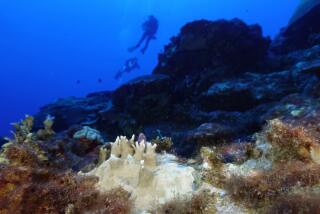Amoco Must Pay $85 Million in French Oil Spill
CHICAGO — A federal judge on Monday ordered the Amoco Corp. to pay $85.2 million for decade-old damages caused when the crippled supertanker Amoco Cadiz drifted into French Brittany’s rocky coast, spilling 68 million gallons of crude oil along 120 miles of picturesque shoreline.
The award, believed to be the largest ever in an environmental case, was far short of the more than $2 billion asked by the various parties--ranging from the Republic of France to resorts and fishing villages along the northern French coast--in the complex litigation.
But the decision, coming after years of legal maneuvering and testimony in U.S. District Court in Chicago where Amoco is headquartered, pleased neither the nation’s fifth-largest oil company nor the scores of French plaintiffs.
Appeal Planned
All those involved--with the exception of the French government, which would receive the bulk of the damage award--said they will appeal Judge Frank J. McGarr’s ruling to the U.S. Court of Appeals, delaying a final determination for at least another 18 months. Official French government reaction is likely later this month.
Amoco said the judgment is unlikely to adversely affect its consolidated financial position or its earnings, regardless of the outcome of any appeal. In a prepared statement, the company said the damage award would be covered by insurance, reserves and a damage fund it set up in France in 1978 shortly after the accident.
McGarr said his decision was meant to send a message “to the world that our constantly recurring problems of environmental damage are serious and that those perpetuating them are going to be responsible and we all ought to be much more careful than we are.”
Monday’s ruling was the latest stop in a legal voyage that began on a stormy March 16, 1978, in the English Channel when the 900-foot-long, 300-foot-wide Amoco Cadiz, loaded with $25-million worth of Middle East crude oil, lost its steering.
Punctured Hull
The giant ship drifted out of control along the rocky coast, its punctured hull leaking tar-like crude that smothered oyster beds, choked fishing waters and covered resort beaches with a sticky, smelly black blanket that trapped birds and wildlife. It has been called the worst marine oil spill ever to reach shore.
Life along the coast, where the economy is dependent on fishing and tourism, was disrupted for years, and some ecologists claim the region’s famed oyster beds will never fully recover.
After months of cleanup, the French government, towns, merchants, oyster farmers, resort owners and fishermen filed suits in the United States to avoid restrictive French liability limits.
McGarr ruled in 1984 that Amoco and the Spanish firm that built the vessel, Astilleros Espanoles S.A., were liable for damages. Amoco has blamed the shipbuilder.
Damage Hearings
The judge spent the last 17 months hearing testimony and reviewing documents related to the amount of damages. He refused to allow a jury to hear the damage portion of the case. McGarr said it was unfair to disrupt citizens’ lives for the year it would take to hear the case and argued that the testimony and other evidence, which filled a large federal building room, was too complex for a jury.
“The judgment is much more than Amoco conceded it was liable for and much less than the plaintiffs sought,” said McGarr, adding that he disallowed substantial portions of the French claims because they “were almost always seriously and greatly exaggerated.”
“They reasoned the best way to get what they were entitled to was to ask for three, four, five times what the claims should have been and that’s what they did.”
The judge also said that he did not award damages for French claims of “loss of enjoyment,” defined by lawyers for the French as an inability to enjoy a normal environment.
‘Claims Exaggerated’
Amoco said that “the court’s judgment supports (Amoco’s) position . . . that the claims of damages from this unfortunate incident were exaggerated. We are nevertheless disappointed that the court awarded even the amount of damages it has.”
The company said it will ask the Court of Appeals to reverse the damage award and that it will also continue in its attempts to recover damages from the shipbuilder.
The judgment “is a little short,” said Charles Josselin, former minister of transportation and one of a small army of French officials who came to hear the judge’s decision. “The damage to the ecological system was not recognized in the decision.”
Also disappointed was Jean-Baptiste Henry, the deputy mayor of Plouguiel, who has represented French interests throughout the long trial. “I am divided. Amoco was condemned but the penalty for Amoco’s mistakes was not sufficient,” he said.
The case has been a cause celebre in France. Numerous French journalists joined French officials in Chicago for Monday’s decision.
More to Read
Sign up for Essential California
The most important California stories and recommendations in your inbox every morning.
You may occasionally receive promotional content from the Los Angeles Times.










